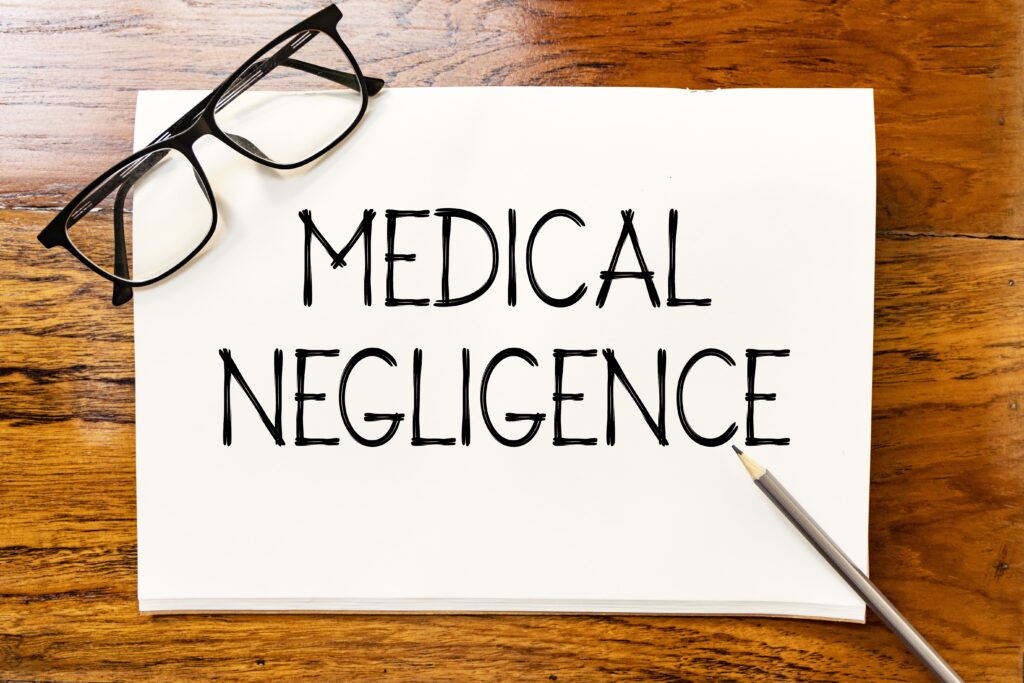What is Medical Negligence?
Gregg Hollander | October 11, 2024 | Negligence

Medical negligence is a legal concept surrounding the actions or inactions of healthcare providers or facilities that can have profound and sometimes life-altering consequences for patients and their families. When healthcare professionals fail to meet the expected standard of care and patients suffer, they may have grounds to pursue a medical negligence claim. Understanding what constitutes medical negligence, the elements that must be proven in court, and the forms of compensation available is essential for anyone who believes they have been harmed by substandard medical care.
Hiring a Boca Raton medical malpractice attorney is imperative if you or someone you love has been the victim of medical negligence. They can help you understand the concept of medical negligence, explain its key legal components, review your case, and fight tirelessly for the compensation you deserve.
What is Medical Negligence?
Medical negligence occurs when a healthcare professional fails to provide the standard of care that a reasonably competent professional would have delivered under similar circumstances, and that failure results in harm to the patient. In simpler terms, medical negligence happens when a doctor, nurse, or other medical provider makes a mistake or fails to act as they should have, leading to injury or worsening the patient’s condition.
Negligence can happen in various medical settings, including hospitals, clinics, private practices, nursing homes, and outpatient facilities. It may involve any number of healthcare providers, including doctors, nurses, surgeons, anesthesiologists, pharmacists, physical therapists, and even administrators.
Medical negligence is a type of medical malpractice that refers broadly to professional misconduct or failure by a medical professional. Medical malpractice cases can involve negligence, recklessness, or intentional harm. However, most malpractice claims revolve around some form of medical negligence.
Elements of a Medical Negligence Claim
To prove medical negligence in court, a patient (or their attorney) must establish four key elements: duty of care, breach of duty, causation, and damages. Each element must be demonstrated with evidence to recover compensation successfully.
Duty of Care

The first element of a medical negligence claim is the duty of care. Every healthcare provider has a duty to provide care that meets a certain standard, defined as the level of care that a reasonably skilled and competent healthcare professional would provide under similar circumstances.
For instance, a general practitioner is expected to diagnose common illnesses and refer patients to specialists when necessary. A surgeon is expected to perform operations with care and precision. These duties are dictated by the type of medical care being provided and the circumstances under which it is given.
However, a duty of care only exists when there is a formal relationship between the patient and the medical provider. In other words, if you ask a doctor for informal advice at a social event, and the doctor makes an offhand remark that later turns out to be incorrect, you likely do not have grounds for a medical negligence claim. However, if a doctor formally treats you in a hospital or clinic, that professional must provide appropriate care.
Breach of Duty
Once the duty of care is established, the patient must prove that the healthcare provider breached that duty. A breach occurs when the medical provider fails to meet the expected standard of care. It can involve a range of actions or inactions, such as:
- Misdiagnosis or delayed diagnosis of a condition
- Prescribing incorrect or harmful medications
- Surgical errors, such as operating on the wrong body part
- Failure to provide appropriate follow-up care
- Failure to obtain informed consent before a procedure
In each case, the breach occurs when the healthcare provider does something that a reasonably competent professional in the same field would not have done. It can also occur when the provider fails to do something a competent professional would have done. For instance, failing to order necessary tests or ignoring important symptoms can be considered a breach of duty.
Causation
Even if a breach of duty can be proven, that alone is not enough to establish a medical negligence claim; the patient must also show that the breach of duty directly caused their injury or worsened their condition. This is known as causation.
Causation can sometimes be challenging to prove, especially if the patient is already suffering from a severe illness or injury. For example, if a patient was undergoing treatment for cancer and their doctor failed to diagnose a secondary condition, it may be challenging to prove that the doctor’s negligence directly caused additional harm.
To establish causation, the patient (or, more likely, their medical malpractice lawyer) must demonstrate that the injury or harm would not have occurred if the healthcare provider had met the standard of care. It often requires the testimony of medical experts who can explain how the negligence directly led to the patient’s injury.
Damages
The final element of a medical negligence claim is damages. To recover compensation, the patient must show that they suffered actual harm due to the provider’s negligence. Damages can include a wide range of physical, emotional, and financial harm, such as:
- Medical bills for additional treatment or surgery
- Lost income or loss of earning capacity due to the injury
- Physical pain and suffering
- Emotional distress or trauma
- Loss of quality of life or ability to enjoy daily activities
- In some cases, wrongful death damages if the patient dies as a result of medical negligence
A medical negligence claim cannot succeed without demonstrable damages, even if all other elements are proven. Therefore, patients need to keep detailed records of their medical treatment, expenses, and the impact of the injury on their lives.
Examples of Medical Negligence

Medical negligence can take many forms, depending on the circumstances of the case and the type of healthcare being provided. Here are some common examples of medical negligence:
Misdiagnosis or Delayed Diagnosis
One of the most common forms of medical negligence is misdiagnosis or delayed diagnosis. When a doctor fails to diagnose a condition correctly or takes too long to reach a diagnosis, the patient may miss critical opportunities for treatment. It can lead to the progression of the disease, additional complications, or even death.
For instance, if a doctor fails to recognize the signs of cancer and delays ordering tests or treatment, the patient’s cancer may advance to a more severe stage, requiring more aggressive treatment and lowering the patient’s chances of survival.
Medication Errors
Medication errors are another common form of medical negligence. These errors can occur when a doctor prescribes the wrong medication or dosage, a pharmacist fills a prescription incorrectly, or a nurse administers the wrong drug to a patient.
Medication errors can have serious consequences, especially if the patient is allergic to the medication or if the incorrect drug interacts negatively with other medications the patient is taking.
Surgical Mistakes
Surgical errors are often cited in medical negligence claims. These mistakes can include operating on the wrong body part, leaving surgical instruments inside the patient’s body, or performing unnecessary surgery. Errors during surgery can lead to severe complications, infections, or even death.
Anesthesia Errors
Errors in administering anesthesia can be particularly dangerous. Too much anesthesia can cause brain damage or death, while too little can result in the patient waking up during surgery. Anesthesia errors can also occur if the provider fails to monitor the patient’s vital signs during surgery, leading to complications.
Birth Injuries
Medical negligence during childbirth can have devastating consequences for both the mother and the baby. Birth injuries can result from improper use of forceps, failure to monitor the baby’s vital signs, or failure to perform a timely C-section when necessary. These injuries can lead to long-term disabilities, such as cerebral palsy or Erb’s palsy.
Failure to Provide Follow-up Care
Medical treatment doesn’t end when the patient leaves the hospital or clinic. Healthcare providers must provide appropriate follow-up care to monitor the patient’s recovery and address complications. Failing to provide adequate follow-up care can worsen conditions or cause unnecessary suffering.
How to File a Medical Negligence Claim
If you believe you have been a victim of medical negligence, it’s essential to act quickly to protect your rights. Here are the steps you should take:

Seek Medical Attention
The priority is to seek medical treatment for any injuries or complications caused by the negligence. It may involve seeking a second opinion, undergoing corrective surgery, or receiving additional treatment to manage the harm.
Document Everything
Keep detailed records of all medical treatments, bills, and communications with healthcare providers. This documentation will be essential in building your case. Additionally, note how the injury has affected your daily life, including your ability to work, perform routine tasks, or enjoy activities you once participated in.
Contact a Medical Malpractice Attorney
Medical negligence cases are highly complex and require the skills of a seasoned medical malpractice attorney. An attorney can help gather the necessary evidence, identify medical experts, and navigate the legal process. Your attorney will also ensure that your claim is filed within the statute of limitations, typically two years in most states.
File a Pre-Suit Notice
In many states, patients must file a pre-suit notice before filing a formal medical negligence lawsuit. This notice informs the healthcare provider that you intend to file a claim and allows them an opportunity to resolve the issue before litigation begins.
Pursue Settlement or Go to Trial
Many medical negligence cases are resolved through settlement negotiations, where the healthcare provider agrees to compensate the patient in exchange for avoiding a lengthy court battle. However, if a settlement cannot be reached, your attorney may take the case to trial, where a judge or jury will decide the outcome.
The Role of a Medical Malpractice Attorney
If you believe you or a loved one have been a victim of medical negligence, seek legal representation from a skilled medical malpractice attorney as soon as possible. These attorneys are well-versed in handling cases where healthcare professionals have failed to meet the standard of care, resulting in harm or injury to their patients.
A medical malpractice lawyer can provide the following services:
- Initial Consultation: During the initial consultation, the attorney will evaluate the details of your case, review your medical records, and assess the merits of your claim. They will listen to your concerns and answer any questions you may have.
- Case Investigation: A medical malpractice attorney will thoroughly investigate your case, gather valuable evidence, and consult medical experts to determine if medical negligence occurred. They will review medical records, interview witnesses, and analyze the facts of your case to build a strong argument.
- Expert Testimony: Medical malpractice cases often rely on expert testimony to establish the breach of duty and causation. An experienced attorney will have access to a network of qualified medical experts who can provide testimony and opinions to support your claim.
- Negotiations and Settlements: A skilled attorney will negotiate with the healthcare professional’s insurance company to seek a fair settlement on your behalf. They will use their knowledge and experience to advocate for your rights and maximize your compensation.
- Litigation: A medical malpractice lawyer will file a lawsuit and represent you in court if a settlement cannot be reached. They will handle all the legal procedures, gather evidence, present your case to a judge and jury, and fight for your rights.
- Compensation: The ultimate goal of a medical malpractice attorney is to help obtain the compensation you deserve. It can include reimbursement for medical expenses, lost income, pain and suffering, emotional distress, and future medical needs.
Know Your Rights in Medical Negligence Cases, Call A Skilled Medical Malpractice Attorney Today

Gregg M. Hollander, Boca Raton Medical Malpractice Attorney
Medical negligence is a serious issue that can have long-lasting effects on patients and their families. If you or a loved one has been harmed due to substandard medical care, it’s vital to understand your rights and options. By working with an experienced Boca Raton personal injury attorney, you can hold negligent healthcare providers accountable and seek the compensation you deserve for your injuries and losses.
Navigating a medical negligence claim can be challenging, but with the right legal representation, you can achieve justice and secure the financial support needed to move forward. Reach out today for help.
